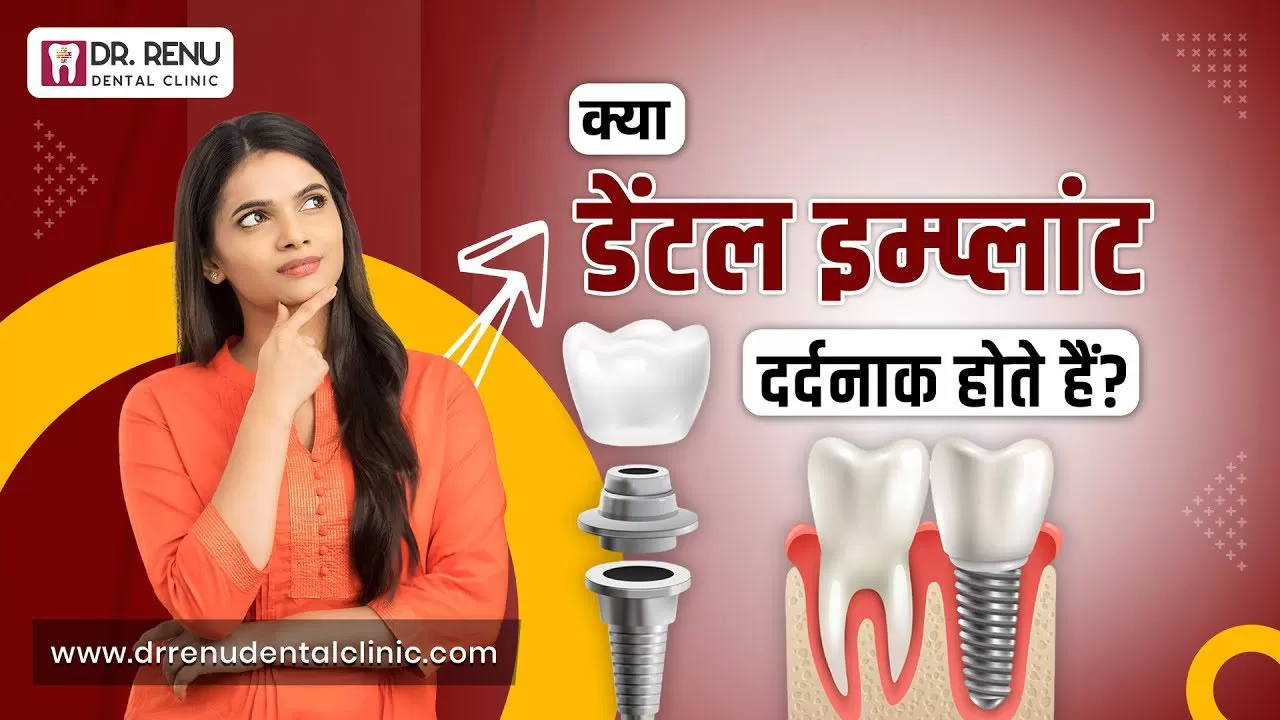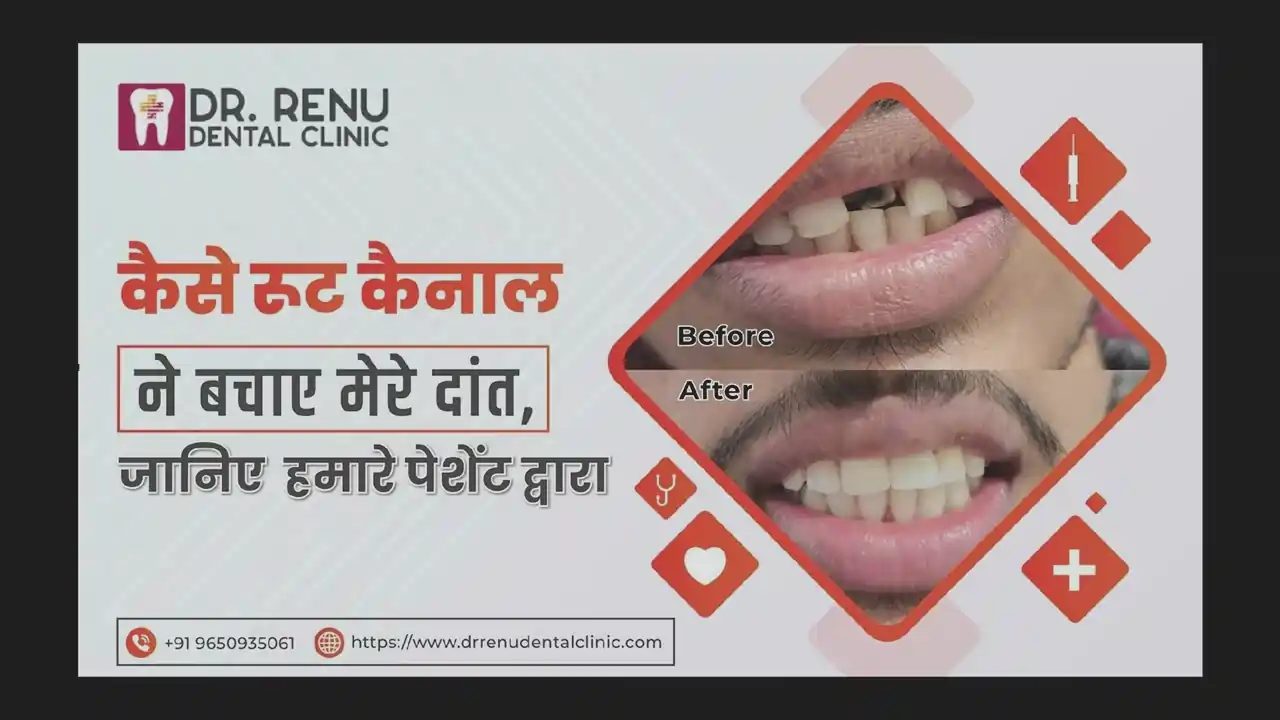Call us
+919650935061Address
Nirman Nagar, JaipurGoogle Rating
5.0( 607+ Reviews )

Overview
What are Dentures?

Overview
What are Dentures?
Dentures in Jaipur are modern appliances meant to restore teeth. These artificial teeth can be implanted in both the lower and upper jaws as a full set or made to fill in gaps left by missing teeth as partial dentures. Dentures are made of safe-to-use materials like acrylic, nylon, resin, porcelain, and metal. These are custom-made to fit in the patient’s mouth and are of many types. While some dentures can be removed for cleaning at night, some stay stuck in the place with additional stability. The set of artificial teeth comes with artificial gum that is then connected to a metal framework holding the entire set in place.
Signs That you Need
What are the Signs That you Need Dentures?
Dentures might be life-changing for a lot of people. Hence, here are the signs that you may require one for a better smile and mouth function:
Tooth Pain
If you have severe tooth pain, bleeding in the gums, and other similar symptoms, it might be a sign of extreme tooth decay. In such cases, conventional techniques cannot save the tooth from a damaged pulp. Dentures can save the day!
Aesthetic Concerns
If you are uncomfortable with how your smile appears in public because of misaligned teeth or large gaps between damaged teeth, you can try dentures to restore a pleasing smile.
Damaged gums
In case of gum diseases and bacterial infection in the mouth, severe damage to the gums may occur. This can lead to tooth loss in the later stages as well. Hence, putting on dentures may cover up the gaps and make your smile look perfect.

Missing Teeth
Missing teeth can make chewing food hard, smiling unpleasant and even disrupt the overall oral health. In such a case, getting dentures ensures getting back a perfect set of teeth. You can go for partial dentures as well instead of choosing complete artificial sets.
Difficulty Chewing
Dentures in Jaipur are the best option for you if you feel difficulty chewing sticky or hard food. Dentures, being a practical solution to the problem, can help you gain back teeth stability and strength to be able to chew without discomfort again.
Loose Teeth
If you have loose or shifting teeth with big gaps, it could be a sign of periodontal disease. After getting treated for the issue, you can consider getting dentures to have a better and stronger set of teeth to use.

Tooth Pain
If you have severe tooth pain, bleeding in the gums, and other similar symptoms, it might be a sign of extreme tooth decay. In such cases, conventional techniques cannot save the tooth from a damaged pulp. Dentures can save the day!
Aesthetic Concerns
If you are uncomfortable with how your smile appears in public because of misaligned teeth or large gaps between damaged teeth, you can try dentures to restore a pleasing smile.
Damaged gums
In case of gum diseases and bacterial infection in the mouth, severe damage to the gums may occur. This can lead to tooth loss in the later stages as well. Hence, putting on dentures may cover up the gaps and make your smile look perfect.
Missing Teeth
Missing teeth can make chewing food hard, smiling unpleasant and even disrupt the overall oral health. In such a case, getting dentures ensures getting back a perfect set of teeth. You can go for partial dentures as well instead of choosing complete artificial sets.
Difficulty Chewing
Dentures in Jaipur are the best option for you if you feel difficulty chewing sticky or hard food. Dentures, being a practical solution to the problem, can help you gain back teeth stability and strength to be able to chew without discomfort again.
Loose Teeth
If you have loose or shifting teeth with big gaps, it could be a sign of periodontal disease. After getting treated for the issue, you can consider getting dentures to have a better and stronger set of teeth to use.
Health Tips
Your Guide to a Healthier Smile
Our health tips video is given below which gives you a guide and practical advice to maintain a healthy smile. Learn expert tips from Dr. Renu on oral hygiene, preventive care, and nutrition to keep your teeth strong and bright every day.

15+ Years of Experience

Meet Our Doctor
Dr. Renu Chaudhary
BDS, MDS & PGCOI(PGI)
Dr. Renu Chaudhary has operated on tens of thousands of patients with more than 20,000 dental procedures. She specialises in providing effective and affordable dental care to patients. She has also worked, with decades of experience, to cure dental ailments like tooth decay and gum diseases. She offers quick solutions to perfect oral appearance through cosmetic procedures as well. Several types of dentures for missing teeth are provided at her clinic in Jaipur. With her attention to the comfort and convenience of the patients, she is currently the best dentist for dentures teeth in Jaipur.
20K+
Dental Procedures
10K+
Smile Makeovers
20K+
Happy Patients
Why Choose
Why Choose Dr. Renu Dental Clinic for Dentures?
Dr. Renu Dental Clinic offers some of the best dentures teeth in Jaipur. Here are more reasons why you should choose it:
Years of Experience
Dr. Renu offers professional care and years of expertise. She has been treating patients for over 15 years, and her patients receive accurate diagnoses and proper care.
Advanced Clinic
The clinic has the best and most modern equipment, making oral examinations, procedures, and surgeries easy and efficient. The technology also helps keep the tests accurate.
Affordable Pricing
The pricing for all surgeries and cosmetic procedures is kept at affordable levels to ensure that patients do not incur a heavy financial burden while being treated.
Years of Experience
Dr. Renu offers professional care and years of expertise. She has been treating patients for over 15 years, and her patients receive accurate diagnoses and proper care.
Advanced Clinic
The clinic has the best and most modern equipment, making oral examinations, procedures, and surgeries easy and efficient. The technology also helps keep the tests accurate.
Affordable Pricing
The pricing for all surgeries and cosmetic procedures is kept at affordable levels to ensure that patients do not incur a heavy financial burden while being treated.
What are the Types of Dentures?
Dentures in Jaipur are available in different varieties, some catering to missing teeth sets while some are replacing only a couple of teeth here and there. Here are the types of dentures:
1. Complete Dentures
Dentists use Complete Dentures to assist people with completely missing natural teeth. These are full sets of artificial teeth attached to synthetic gums that are made to fit inside the mouth.
2. Incomplete Dentures
Incomplete or partial dentures are artificial teeth and gums that replace some gaps made by natural teeth that are missing in the mouth. Unlike complete dentures, these do not come in a set of full artificial teeth.
3. Over Dentures
Overdentures can be both complete or partial denture procedures that fit over preexisting natural teeth in the mouth or dental implants. More often than not, these natural teeth are damaged,d or some of them are missing.
4. Snap-in Dentures
Snap-in Dentures are kept in place with the help of dental implants surgically implanted in the jawbone. These offer a better and more secure fit with better chewing ability and stability as compared to conventional dentures.
5. Implant-Supported Dentures
Implant-supported dentures are kept in place by dental implants that are placed into the jawbone with surgery. They are a better option for people wanting strong and stable teeth.
What is the Procedure Involved in Placing Dentures?
Getting complete and partial dentures in Jaipur is convenient with modern technologies. Here are details on the procedure involved in placing dentures in Jaipur:
- Step 1: Consultation
The first step in getting dentures in Jaipur is an initial consultation with your dentist. The dentist will conduct an oral examination and other tests to determine the type of denture that best suits your needs.
- Step 2: Taking Impressions
Then, impressions of the jaw where natural teeth are missing are taken. This impression helps create a plaster model with a near-natural fit. The acrylic plates are placed in the mouth to check the alignment of the teeth, and if they are correctly aligned, the dentures are made.
- Step 3: Denture Delivery
After the dentures are made, your dentist will place them in your mouth. The dentist will also explain how to remove and replace them and provide any other aftercare instructions.
What are the Benefits of Dentures?
Here are the various benefits of dentures in Jaipur that help patients gain a better life:
- 1. Improved Ingestion
Getting dentures in Jaipur ensures that the artificial teeth are perfectly aligned with the patient’s jaws. They help the patient chew even the most sticky and hard food, which helps regulate food intake and improves ingestion.
- 2. Reduced Discomfort
Before getting dentures, patients usually face problems such as swelling in the gums, redness around the teeth, and damaged tooth pulp, which makes the teeth sensitive. Dentures eliminate these problems.
- 3. Enhanced Appearance
Dentures can also be done purely because of aesthetic reasons. If a person wants to get a better and healthier-looking smile, dentures may be the best choice in the market today.
- 4. Improved Speech
Due to teeth loss, patients often suffer from impaired speech function. Dentures–complete or partial–help improve speech function by reducing the gap between teeth, replacing missing teeth, and keeping them strong.
- 5. Better Nutrition
Due to the improved capability to take in hard and sticky substances, the chances of getting better nutrition also increase. Hence, getting dentures is also indirectly related to gaining a healthier intake.
- 6. Stronger and Stable Teeth
Dentures are artificial teeth and gum made from materials like acrylic and resin. However, these materials are hardened before use and are strong enough to assist patients in everyday usage. These are also extremely stable.
Transform Your Smile with Expert Dental Care!
Let’s Request a Schedule For Consultation
Book AppointmentHow to Take Care of Dentures?
Dentures in Jaipur are an effective way to get back optimum oral health. Here is how to take care of them for maximum longevity:
- 1. Removing Them Before Sleep
Every night before you get to bed and sleep off, be sure to remove your dentures and place them in a secure place to avoid hurting your mouth or damaging the artificial teeth.
- 2. Cleansing
To avoid infections or bacterial build-up, you can clean the denture with a denture cleaner solution and a normal brush. Dentures are supposed to be cleaned regularly.
- 3. Using Denture Solution
Denture solution is used to store the entire set of artificial teeth and gums when not in use. This can be used at night when you put away your dentures or maybe while brushing your teeth.
- 4. Brushing Thoroughly
Using dentures can lead to plaque buildup in areas of your mouth. So, it is essential to keep up your oral hygiene with regular brushing and flossing. YOu may also use a mouthwash for extra benefits.
- 5. Handle with Care
Dentures, though acrylic-made and hard to break, are prone to damage if not handled properly. Hence, it is important to keep them in solution when not in use or to set them aside to prevent breakage.
- 6. Routine Checkups
Routine checkups after you get dentures are important to make sure that the dentures are working fine for you and the oral health of your mouth is i=not compromised as well. This is also important to keep away any early infection signs.
What are the Things to Know Before You Get Dentures?
Getting dentures is easier than maintaining them while in use. Hence, here are the things to know before you get dentures:
- 1. Denture Hygiene is Crucial
Since dentures are not real teeth and gums, they are prone to getting unclean and catching infection-causing bacteria and plaque build-up really fast. So, keeping them clean using denture cleaners is important.
- 2. Dentures Should Be Removed When Not in Use
While sleeping or while brushing, the dentures should be removed and put in a denture solution to avoid damage to both the artificial teeth and your gums.
- 3. Dentures Can Be Uncomfortable
At first, when you get dentures in Jaipur, it can be a little uncomfortable and even cause minor discomfort at times. With time, you get accustomed to the acrylic set of teeth, and the discomfort subsides.
- 4. Dentures Require Practice
Using dentures to follow through with everyday tasks can require practice for people. Two major activities of eating and talking with new dentures are hard to navigate initially for the patients. But with time, it gets better.
- 5. Dentures Can Require Repairs
Dentures can get damaged after prolonged usage and may require repairs or even complete replacement as well. If such a scenario arises, getting your dentist’s attention to the issue might be the best thing to do.
- 6. Getting Dentures Takes Time
Dentures are custom-made for each person. So, the process starts with getting a consultation, then impressions of the gum and teeth, and then the acrylic plates are made and placed on the mouth. After getting a perfect fit, the dentures are prepared and delivered.
How Long Do Dentures Last?
Dentures in Jaipur last a long time, up to 7 to 10 years. However, proper maintenance and denture hygiene ensure a decade-long lifespan. After that, most people will inevitably need to change their dentures.
Patients are suggested to get denture therapy every one or two years to ensure the denture fits well and supports everyday tasks like eating and talking effortlessly. The dentist may also add material to the denture to make it more comfortable and convenient.
What are the Do’s and Don’t of Dentures?
Given below are the various Do’s and Dont’s of Dentures that should be followed by patients for a prolonged denture life:
| Do’s | Don’t’s |
|---|---|
| Soak the dentures overnight in a denture solution. | Do not bite on hard and sticky food immediately after getting dentures. |
| Rinse the dentures every morning before use. | Do not use objects like toothpicks on dentures. |
| Brush with soft bristles, and the dentist suggested toothpaste must be used. | Do not drop them since they are fragile and prone to breakage. |
| Maintain oral hygiene and take care of your gums, tongue, and teeth. | Upon getting loose, do not try to fix them at home. |
| Get yourself routine checkups. | Do not ignore the instructions given by your dentist. |
| Get dentures to relax every one to two years. | Do not avoid brushing your dentures every day to maintain hygiene. |
What are the Limitations of Dentures?
Dentures, though, solve a lot of problems and can have certain limitations while in use as well. Here are some of them:
- 1. Loose Dentures
With time, the dentures can loosen up and cause the teeth to get wobbly. This issue of destabilised teeth can only be treated at your dentist’s. This rarely occurs but requires immediate medical attention.
- 2. Initial Discomfort
After getting dentures, it may feel uncomfortable or even have mild discomfort in the region. That is completely normal and may subside in the next few days.
- 3. Jawbone Shrinking
With tooth loss, the jawbone usually shrinks in the hollow of the cheeks and enlarges with time, causing the face to change appearance. Using dentures might put pressure on the jaw as well as the cheeks, causing a bit of discomfort in the initial days.
- 4. Need of Practice
Using dentures requires practice to perfect speech functionality as well as chewing function. Initially, this can feel cumbersome, but with time, the function will become a muscle memory.
- 5. Time-Consuming Procedure
Getting dentures is time-consuming and may take more than one or two visits to the dentist. Since they are custom-made, the impression and the fitting take time. This, in turn, can exhaust the patient in the process.
- 6. Maintenance Required
Getting dentures requires a lot of maintenance to extend their lifespan and not get a loose denture set. In addition, maintaining oral hygiene maintained is also essential to avoid any oral diseases.
Cost of Getting Dentures in Jaipur
The cost of getting dentures in Jaipur depends on various factors, such as:
- 1. Dentist’s Expertise
The dentist’s expertise raises the total cost of getting dentures since the expertise obtained from years of experience in the field often leads to better, quicker and more effective treatments.
- 2. Location of the Clinic
The clinic’s location also affects the total cost of the treatment. While major cities may have higher prices, clinics like Dr. Renu Dental Clinic in Jaipur offer affordable treatments to people with the best services.
- 3. Type of Denture
Dentures in Jaipur are of various types. While some are partial, some are complete sets, and dental implants keep some together. The type of denture decides the price of the procedure.
- 4. Oral Health of the Patient
The oral health of the patient is another determinant in the pricing of the process. This is due to the fact that oral health dictates the type of treatment required, the number of teeth to be replaced and the price it must cost.
Myth & Fact
What are the Common Myths About Dentures?
Using dentures today has become a common practice. However, there are certain myths surrounding the process. They are:
Myth : Eating with Dentures is Difficult
Fact: There is usually no food restriction with dentures on. However, getting a particular diet might be advised for the first few days by your dentist. And with practice, eating with dentures becomes easy with hard food, too.
Myth : Dentures are a Permanent Solution
Fact: Dentures can be damaged if proper care is not taken. Hence, they are not a permanent solution that will not require repair.
Myth : Others Would Know if it is Dentures
Fact: Dentures mimic the way natural teeth appear in the best way possible. Added to that is the modern technologies that make the fit appear seamless. Thus, dentures appear normal to others.
Myth : Dentures Do Not Need Maintenance
Fact: Dentures need maintenance to keep them in good shape and fit for a long time. They need to be stored in a proper denture liquid when not in use and also require everyday cleansing to avoid bacteria buildup.
Myth : Dentures can be Repaired at Home
Fact: Dentures, if damaged, cannot be repaired at home. They should be taken to the dentist for a replacement or repair if the damage is minor.
Myth : Dental Checkups are No Longer Necessary
Fact: Even after getting dentures, routine checkups by dentists are necessary for better oral health and a good denture life. Dentists may identify any possible risks or infections caused by denture usage early on.
Testimonial (Google Reviews)
Patient Feedback on Google
Here is what our happy patients say on Google about Dr. Renu Dental & Multi Speciality services their visit experience and the results of offered treatments.
Vipin Khandelwal
I had an excellent experience at Dr. Renu Dental Clinic. The staff is incredibly friendly and professional, creating a welcoming and comfortable environment. Dr. Renu's expertise and gentle approach made the treatment smooth and pain-free. They take the time to explain procedures and answer questions, which is truly reassuring. Highly recommend this clinic for anyone seeking quality dental care!
Anshul Kayath
It was really a good experience at Dr. Renu's dental clinic. She treated our daughter's tooth cavity and pulpotomy done by her was painless. Best dental clinic in the area.
V.K h.k
I visited Dr. Renu Dental Clinic for a teeth whitening and smile makeover and couldn’t be happier with the results. Dr. Renu is the best cosmetic dentist in Jaipur, and her attention to detail is impeccable. My teeth are now brighter, and my smile looks better than ever. I highly recommend Dr. Renu for cosmetic dentistry services.
Jyoti
I recently had a root canal procedure and capping of the tooth done at Dr Renu's dental clinic, and I couldn’t be more pleased with the experience. Dr. Renu and her entire staff were exceptional. From the moment I walked in, I was greeted with warmth and professionalism. The procedure was explained thoroughly, and Dr. Renu ensured I was comfortable throughout. The entire team demonstrated great expertise and care, making a potentially stressful experience quite pleasant. The follow-up care has been impeccable, and I’m delighted with the results. I highly recommend Dr.Renu and her team for anyone seeking top-notch dental care."
FAQs
Everything You Need to Know
At our clinic, patient satisfaction and trust are our top priorities. Dr. Renu Chaudhary.
Dentures are prosthetic teeth that replace original or natural teeth. They consist of acrylic teeth connected to gum-like material, which is then mixed into the upper and lower jaws.
Dentures come in various types, including complete and partial Dentures Treatment in Jaipur, removable dentures, and custom-made dentures designed for a natural fit. Complete dentures are ideal for those who have lost all their teeth, while partial dentures are best for those with some natural teeth remaining. If you’re looking for the most comfortable and affordable dentures cost in Jaipur, consulting the best dentist for dentures teeth in Jaipur at Dr. Renu Dental Clinic can help you choose the right option based on your dental condition and lifestyle needs.
You can eat with dentures on. However, eating with new dentures requires you to eat softer foods and less sticky things. With time, you can also eat hard food.
There is no best type of denture since each one is made to meet the patient's specific needs. While tooth loss may require partial dentures, complete dentures may support people with a miss of teeth.
Dentures are made of acrylic to mimic the appearance of natural teeth, but they can also be made of nylon or metal. They fit into the gums and fill in the gaps left by missing teeth.
You can clean dentures with toothpaste, soap, or any other cleaning liquid. You can brush off the upper layer with a soft-bristled toothbrush and make use of warm water for rinsing.
It is recommended to avoid sleeping with dentures overnight. This allows your gums to rest and also helps in avoiding any potential oral health risks. You can store the dentures in denture liquid provided by your dentist.
Getting dentures is not painful, but getting used to them might cause some discomfort. It is normal, however, to experience uncomfortable movements initially before getting used to the false teeth.
Dentures can stay in permanently if they are implant dentures, over dentures or any implant-supported denture. These can stay fixed to the gums, unlike the traditional removal dentures.
The dentures cost in Jaipur depends on various factors, such as the type of dentures (complete or partial), the material used, and whether they are removable or fixed dentures. Generally, custom-made Dentures Treatment in Jaipur may have a slightly higher price due to their personalized fit and comfort. If you are searching for an affordable dentures cost in Jaipur, Dr. Renu Dental Clinic offers budget-friendly options with expert care to ensure a natural-looking smile and improved chewing functionality.
Complete Dentures Treatment in Jaipur are designed for patients who have lost all their teeth, while partial dentures help replace a few missing teeth, maintaining the alignment of the remaining natural teeth. The lifespan of dentures teeth in Jaipur depends on proper care and regular dental visits. Typically, well-maintained dentures from the best clinic for Dentures Treatment in Jaipur can last between 5 to 10 years before requiring replacement or adjustment.
Finding the best dentist for Dentures Treatment in Jaipur ensures you get high-quality, comfortable, and durable dentures. At Dr. Renu Dental Clinic, we specialize in custom-made dentures that restore your smile and confidence. To maintain your dentures teeth in Jaipur, clean them daily with a soft brush, soak them overnight in a cleansing solution, and visit a dentures specialist in Jaipur for regular check-ups and adjustments.














 Facebook
Facebook
 Instagram
Instagram